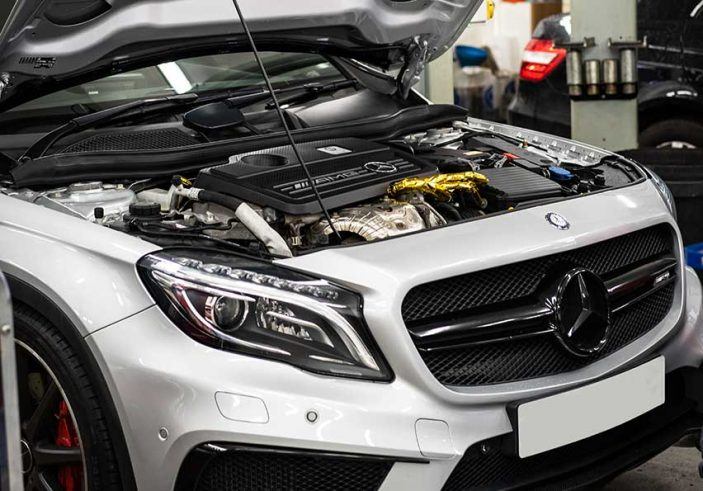Modern Mercedes-Benz vehicles are marvels of automotive engineering, packed with sophisticated electronic systems that work seamlessly together to deliver the refined driving experience we’ve come to expect. However, this complexity means that early detection of electrical issues becomes absolutely crucial for maintaining your vehicle’s performance and avoiding potentially costly repairs down the line.
The Subtle Signs Your Mercedes Is Trying to Tell You Something
Unlike the dramatic warning lights of yesteryear, today’s Mercedes electrical systems often provide subtle hints long before major problems develop. Learning to recognise these early indicators can save you considerable time, inconvenience, and expense.
Dashboard Behaviour Changes Your instrument cluster is essentially the nerve centre of your vehicle’s communication system. If you notice the displays flickering momentarily during startup, or if certain readouts appear inconsistent—perhaps the fuel gauge showing full when you know it isn’t, or the temperature gauge taking longer than usual to reach normal operating levels—these could be early signs of electrical communication issues between modules.
Intermittent Warning Lights A warning light that appears briefly and then disappears is often more concerning than one that stays illuminated. This typically indicates a system that’s on the verge of failure, struggling to maintain proper function. Common culprits include the ABS warning light flashing momentarily during cold starts, or the ESP light appearing briefly when cornering at normal speeds.
Subtle Performance Changes Modern Mercedes vehicles rely heavily on electronic systems for optimal performance. If you notice the steering feeling slightly different—perhaps the speed-sensitive power steering isn’t responding as smoothly as usual—or if the automatic transmission seems to hesitate momentarily before shifting, these could indicate developing electrical faults in the respective control modules.
Why Your Senses Are Your First Line of Defence
Listen for the Unusual Mercedes vehicles are engineered to operate whisper-quietly, so any new sounds should be investigated promptly. Electrical issues often manifest as subtle clicking sounds from the dashboard area, particularly during startup or when operating various systems. The cooling fans may also behave differently if temperature sensors are beginning to fail.
Feel for Changes in Response Your hands and feet are remarkably sensitive diagnostic tools. If the brake pedal feel changes subtly, or if the steering wheel vibrates slightly through the electronic power steering system, these sensations often precede more obvious electrical faults. The accelerator pedal response in drive-by-wire systems can also feel different when communication between the pedal sensor and engine management begins to deteriorate.
Visual Cues Beyond Warning Lights Watch for changes in display brightness or colour consistency across different screens. Modern Mercedes vehicles have multiple displays that should maintain uniform appearance. If one screen appears dimmer or shows slightly different colours, this could indicate developing electrical issues with that particular module.
The Critical Role of Star Diagnostics
Mercedes-Benz Star Diagnostics represents the gold standard in automotive electrical system analysis. Unlike generic code readers that provide basic fault information, Star Diagnostics communicates directly with each individual control module in your vehicle using Mercedes’ proprietary protocols.
Comprehensive System Communication A modern Mercedes contains dozens of individual control modules, each monitoring and controlling specific vehicle functions. Star Diagnostics can communicate with every single module, retrieving not just current fault codes but also historical data, adaptation values, and system parameters that reveal the complete electrical health of your vehicle.
Predictive Capabilities Perhaps most importantly, Star Diagnostics can identify developing issues before they cause noticeable problems. The system monitors sensor readings, communication speeds between modules, and electrical supply voltages throughout the vehicle. Trends in this data often reveal components that are beginning to fail, allowing for proactive maintenance rather than reactive repairs.
Manufacturer-Specific Intelligence Generic diagnostic tools simply cannot access the depth of information available through Star Diagnostics. Mercedes engineers embed specific diagnostic routines and troubleshooting procedures directly into the system, providing technicians with guided diagnostic pathways that dramatically improve accuracy and reduce diagnostic time.
Early Warning Signs That Warrant Immediate Attention
Electrical Supply Issues If you notice interior lights dimming slightly when you operate electric windows, or if the infotainment system occasionally restarts itself, these could indicate developing issues with the electrical supply system. Modern Mercedes vehicles have sophisticated power management systems, and early detection of supply issues prevents damage to sensitive electronic components.
Communication Network Problems Mercedes vehicles use multiple communication networks to allow modules to share information. If you experience seemingly unrelated electrical issues—perhaps the air conditioning controls become unresponsive whilst the parking sensors also begin behaving erratically—this could indicate problems with the vehicle’s communication networks.
Sensor Drift Modern Mercedes systems rely on numerous sensors throughout the vehicle. If systems that normally operate seamlessly begin to feel less refined—the automatic wipers not responding as precisely to rain, or the automatic headlights switching on at slightly different light levels—these could indicate sensor calibration drift that warrants investigation.
The Importance of Professional Expertise
Whilst it’s valuable to understand these early warning signs, electrical system diagnosis in modern Mercedes vehicles requires specialised knowledge and equipment. The complexity of these systems means that attempting DIY electrical work can often create more problems than it solves, potentially causing expensive damage to sensitive electronic components.
Regular Star Diagnostic health checks, performed by qualified Mercedes specialists, represent the most effective approach to maintaining your vehicle’s electrical systems. These comprehensive examinations can identify developing issues months before they would become apparent through normal driving, allowing for planned maintenance rather than inconvenient breakdowns.
Maintaining Electrical System Health
Prevention remains far superior to cure when dealing with sophisticated automotive electrical systems. Ensuring your battery is maintained in optimal condition, keeping electrical connections clean and dry, and addressing any warning signs promptly will help preserve the remarkable reliability that Mercedes-Benz has built its reputation upon.
Remember, your Mercedes was engineered to communicate with you through its various systems and displays. Learning to interpret these communications, combined with regular professional diagnostic checks, ensures that you’ll continue to enjoy the refined, dependable motoring experience that drew you to the three-pointed star in the first place.
